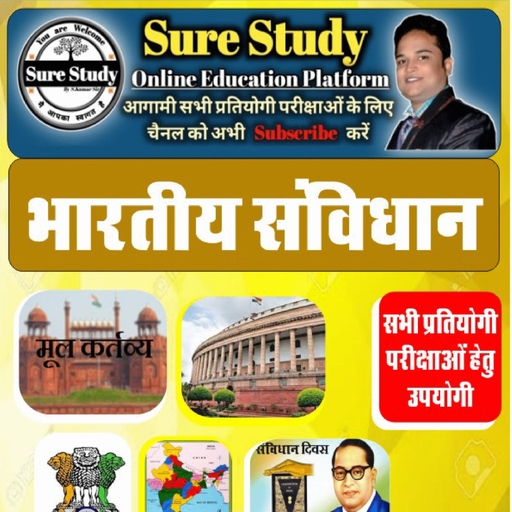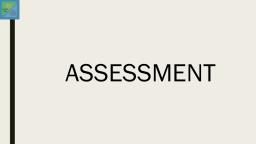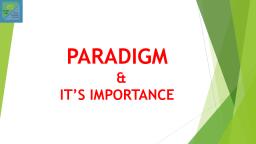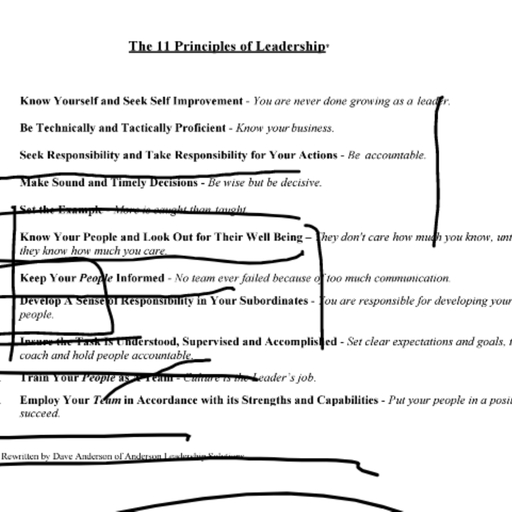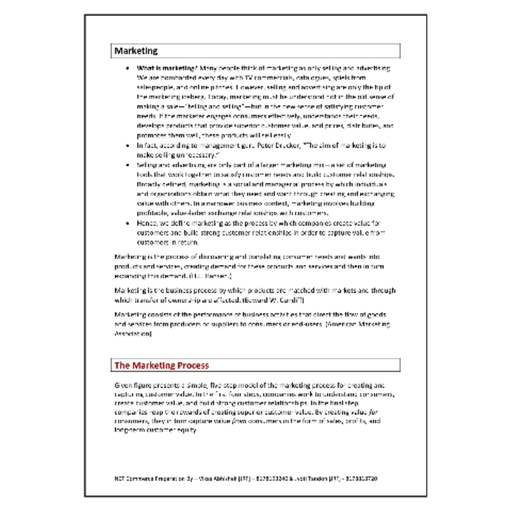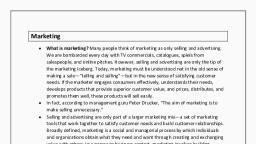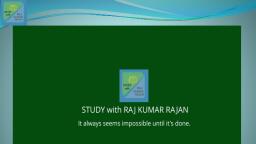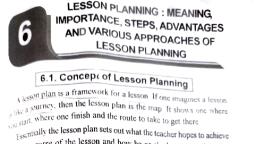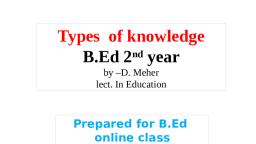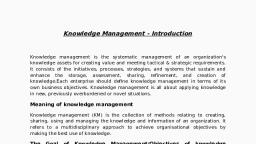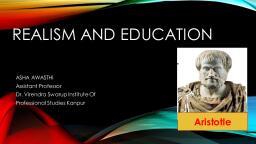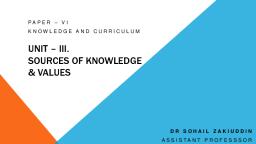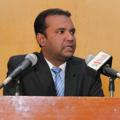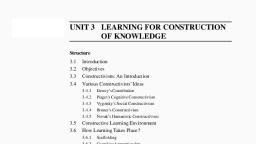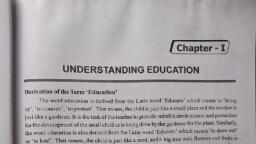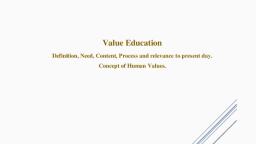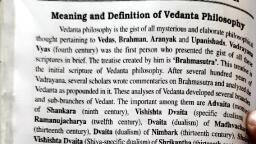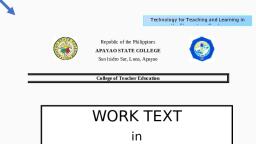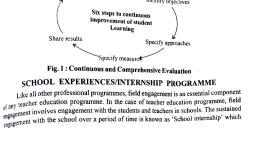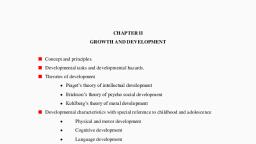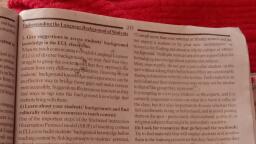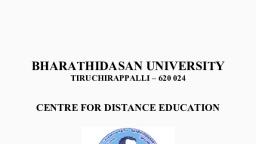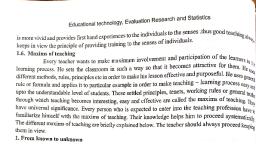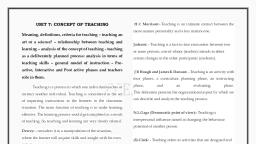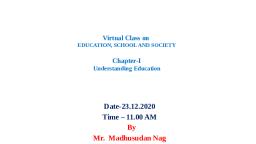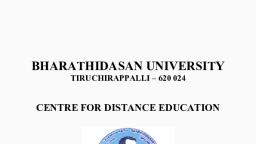Page 1 :
KNOWLEDGE & IT’S VARIOUS SOURCES
Page 2 :
A precise single definition of knowledge, universally acceptable to all and in all contexts, is well, nigh impossible. Scholars who are interested in the study of knowledge, as a resource, as a, philosophical concept, as social wealth, etc. have given their own definitions to suit their line of, studies., The meanings of "Knowledge" as given by the Random HouseDictionary (RHD), and words, synonymous with 'knowledge' are:, • Acquaintance with facts or principles, as from study orinvestigation; general erudition;, • Familiarity or Conversance, as with a particular subject orbranch of learning;, • Acquaintance or familiarity gained by sight, experience, orreport; as for example knowledge, of human nature’;, • The fact or state of knowing, clear and certain perception of fact or truth;, • Awareness, as of a fact or circumstance;, • That which is or may be known; information; and The body of truths or facts accumulated by, mankind in thecourse of time, as for example 'man's knowledge of the moon’.
Page 3 :
Daniel Bell, the Harvard University Professor of Sociology while discussing knowledge' as the, moving force of the Post-industrial Society, gives a comprehensive definition of knowledge as:, "Knowledge is an organised set of statement of fact or ideas, presenting a reasoned judgement, or an experimental result, which is transmitted to others through some communication medium, is some systematic form. Knowledge consists of new judgements (Research and Scholarship) or, presentation oftrueer judgements as exemplified in text books, teaching and learning and, collected as library and archival material., “Alvin Toffler, the well known author of Future Shock, Third Wave and Power Shift, gives, another meaning of knowledge, which includes data, information, images and imagery, as well, as attitudes, values and other symbolic products of society whether true, approximate or even, false., Plato has examined the following three definitions of knowledge:, • Knowledge is perception or sensation;, • Knowledge is true belief;, • Knowledge is true belief accompanied by a rational ground., Plato finally called knowledge as 'Justified truth’, and Dewey denotes knowledge as, 'Inference from truth’.
Page 4 :
The National Curriculum Framework (2005), while placing the experience of the knower at, centre, also defined knowledge., , According to it, "Knowledge can be conceived as experience organised through language into, patterns of thought (or structures of concepts), thus creating meaning, which in turn helps us, to understand the world we live in. It can also be conceived of as patterns of activity, or, physical dexterity with thought, contributing to acting in the world, and the creating and, making of things. Human beings over a time have evolved many bodies of knowledge, which, include a repertoire of ways of thinking, of feeling and of doing things, and constructing more, kknowledg”., Knowledge is a highly organised intellectual product of humans that includes personal, experience, skills, understanding of the different contexts in which we operate our activities,, assimilation of all these and recording all this in a form that could be communicated to others., This communication of recorded experience, data, information, etc. makes for further of, growth. Knowledge, as viewed from a social constructivist approach, emphasise that, individuals and collective groups are continually constructing and reinventing their, understanding of themselves and the world around them.
Page 5 :
While understanding about knowledge, we might have come across many terms such as, information, truth belief and knowledge., These terms are discussed as follows:, Information: ‘Information’ is a very common term and we often use it in our day-to-day, conversation. We receive information from newspapers, radio, television (TV), family, members, relatives, friends, teachers and many other sources like written media, print media, and oral communication. We also generate information by virtue of our involvement in, multifarious activities., According to HWG (2008), information can be defined as, "Any fact or set of facts,, knowledge, news or advice, whether communicated by others or obtained by personal study, and investigation”., , Szymanski defined information as, "Data that has beent processed into an organised, usable, form and is meaningful to the recipient for the task at hand”.
Page 6 :
Everywhere in the world, nay, the universe, innumerable incidents take place every day. Some, persons observe some of these incideats. When the observers are communicating these incidents to, people, they (people) are getting informed or getting information about these incidents., For example, on 21 July 2006, a Haryana boy, called Prince fell intu a deep hole of a bore-well on, his sixth birthday and had to stay there for about 50 hours awaiting his rescue by military personnel., Reporters there were continuously witnessing the rescue operation and airing the news through radio, and television, and people not only in India but also in many parts of the world were getting the, latest information about the rescue of the boy. In this case, an incident gave birth to a lot of, information., A person may thus acquire knowledge by observation, reading, thinking, research, listening, tasting, and feeling. When the person communicates his/her knowledge by telling, writing, printing or, recording, it becomes information., Belief and Truth: Belief is personal and primarily subjective feeling and expectation in a person,, power or other entity, though shared by others; could be verified or beyond verification. This, includes the truth, and everything else we accept as ‘true’ for ourselves from a cognitive, point of view., Truth is a property of beliefs, and derivatively of sentences which express beliefs.
Page 7 :
Knowledge has been classified into different forms based on different conceptulisations. Based on the, way, knowledge is obtained; it can be classified under three heads:, (1) A Priori Knowledge: It is a knowledge whose truth or falsity can be decided before or without, recourse to experience (a priori means 'before). Knowledge that is Apriori has universal validity, and once recognised as true (through the use of pure reason) does not require any further, evidence. For instance, "All bachelors are unmarried" is a priori knowledge. It is because we are, not required to have1 experience the unmarried status but we have this knowledge., (2) A Posteriori Knowledge: This knowledge is based upon observation and experience and it, stresses on accurate observation and exact description. The propositions that fall under this, category can be looked from the point of view of whether they contain any factual content and, from the standpoint of the criteria employed for deciding their truth or falsity. For instance, we, have propositions like:, • Ice melts., • Snow is white., • Metals conduct heat and electricity., These propositions give us factual information whose truth or falsity can be decided only through, observation andverification., (3) Experienced Knowledge: This form of knowledge always tentative and cannot exist prior to, experience or beisconcluded from observation. It must be experienced to havevalue.
Page 8 :
Nature of Knowledge:, The nature of knowledge can be discussed as follows:, , Social Nature of Knowledge, , Knowledge is Abstract, , Knowledge is Comulative, Nature of Knowledge, , Knowledge is Perspectival, , Knowledge is both Limited and limitless
Page 9 :
(1) Social Nature of Knowledge: As knowledge is developedthrough collective pursuit of the community, members of the society, thus, it is socially shared understanding. It is built up: socially, as a product of the, social activity of men and women. Knowledge is not the handiwork of isolated individual mind; knowledge it, is the result of collective pursuit of the society. Though contribution of individuals in immense and the role, individuals in accumulation of generation is knowledge, at any point of history, is tremendous, all the, individuals do this historical act of generating and accumulating the knowledge precisely by participating in, social activity and processes. Not only that, the knowledge no individual stock, into which individuals are, born, provides individuals with a con sense of understanding. Without this, no could have contributed to the, knowledge. Every individual acquires a great deal of knowledge from his own experience; but he would not, do so apart from his association with fellow humans. Therefore, the knowledge is acquired and built up. in, the met acti only in society, and its roots lies in the social activities of man. Hence, knowledge is essentially, social in character., (2) Knowledge is Cumulative: Knowledge is cumulative in nature because it is socially preserved and, transmitted from one generation to the future generations. It is not static, but always grows and develops in, generations. Indeed, as there is scope for newer and newer understanding of reality, knowledge of the reality, gets expanded. As human relations with world of objects and their utilities, ideas and their relevance assumes, newer dimensions over time, human understanding of the world of objects and the world of ideas undergoes, change and in the process adds new knowledge to the existing stock of knowledge. In this way, incomplete, understanding moves towards complete understanding of the reality. Knowledge grows through a process of, not only adding to but also perfecting and correcting the already existing body of knowledge. In no field is, knowledge ever perfect, final and complete. Knowledge is necessarily cumulative; knowledge once, constructed does not perish; because, knowledge, unlike material things that perish after some time, is nonmaterial innature. Therefore, accumulation is inevitable.
Page 10 :
(3) Knowledge is Both Limited and Limitless: The cumulative character of knowledge also informs, us both limit and limitless nature of knowledge. At any particular stage in the development of, humanity, knowledge comes against limits set by the limited character of available experience and by, the existing means in obtaining knowledge. Therefore, knowledge is always limited, and is at the, same time limitless. In other words, the known is always bounded by the unknown but not the, unknowable., , (4) Knowledge is Perspectival: Knowledge does not simply ‘explain’ the objective reality hanging, out there’; it constructs the reality within the limits set by experience. It is not simply explanatory in, character, rather, it is interpretative in character and nature. It is interpreted in a social context. This, inherent character of interpretiveness of knowledge makes it perspectival rather than simply, perceptual. Knowledgedevelops perspectives among knowers., (5) Abstract nature of Knowledge: The various definitions of knowledge, be it common sense, meaning of knowledge that the knowledge is shared understanding; be it justified belief, or verified, belief, or agreement between two ideas or knowledge is sum of concepts, ideas, principles, laws;, point out that knowledge is non-material and abstract in nature.
Page 11 :
Sources of Knowledge: There are various sources of Knowledge, Knowledge through senses, Knowledge through Authority, , Knowledge through Reason, , Knowledge, through intution, , Other Sources, , Sources of Knowledge, , Knowledge, through, Emperocism, , Knowledge, through, Experimentation, , Knowledge, through Tenacity, , Knowledge through Revelation, Knowledge through Faith
Page 12 :
Sense Experience Empirical Knowledge: Senseknowledge: experience is the major source of, knowledge which comes through senses. Modern science is empirical in methods; concepts are, formed as a result of sense experience. By seeing, hearing, smelling, feeling and tasting. We form our, composite of the world around us. An empirical cautions us to "look and see", whereas a rationalist, tells us to "think things through"., Knowledge through Reason: The view which says that our knowledge is essentially knowledge of, universal and that these are known by the mind and not by senses is called Rationalism. Reasoning or, through is the central factor in knowledge forms which we derive universally valid judgements that, are consistent with one another certain mathematical and logical truths, for instance, are 'self evident', kinds of knowledge that appeal to our reason. And two contradictory statements both cannot be true, at the same time. Moreover, when we say that if A is greater that B and B is greater than C, and then, A is greater than C, here we are making a true statement based on reasoning and not derived from the, sense., Knowledge through Authority: The utmost fundamental source of knowledge is authoritarianism. It, may, however, be noted that its central doctrine is that, ultimate source of knowledge is authority of, different kinds, i.e. the God, the Sate and Tradition of the Expert. We should notice that authoritative, knowledge it accepted as true because, comes from experts. The reason for the inadequacy of, authoritative knowledge is what constitute authority and by what criterion we should select our, authority as against another. Most of our factual knowledge is based on authority.
Page 13 :
Following precautions have to be observed in the case of knowledge coming from authority:, • The person must really be an authority, one who is a specialist in his field of knowledge., • Whenever one accepts another person’s statement on authority, he should be able to find, out for himself or verify the knowledge. For example, we can empirically check the truth, of Einstein’s theory of relativity, though it would take years of special training and, experimentation., • The authority should be able to provide evidential proof for the knowledge he possesses, and present a logical explain, • The knowledge claimed by the authority should have acceptance by the other experts in, that area., Knowledge through Intuition: Intuition is perhaps the most personal way of knowing. It, occurs on what psychologists call the subliminal level; beneath the “threshold of, consciousness” it is connected intimately with feeling and emotion and contrasts with the, logical process usually associated with thinking at conscious level. As persons, we see “in a, sudden flash of insight” that something is the case. We apprehend knowledge directly gain, direct access into the heart of reality. Yet, we do not know how we acquired this knowledge., Only an intense feeling seems to convince us we have discovered what we were looking for.
Page 14 :
Revealed Faith Knowledge: Faith is in part the king of knowledge that God discloses to man. In, this omnisense, God inspires certain men to record. His revelation in permanent form, whereby it, may become accessible to all mankind for the Hindu’s it is contained in the Bhagavad-Gita and the, Upanishads, For Christian’s and Jew’s, it is contained in the Bible: for the Mohammedan’s, in the, Quran. Divinely authenticated, it promises that those who accept it nev never, according to their, own rights, can be mistaken. Human pretation may distort parts of it, but in itself it is Devine, interpretation truth. You will agree that revealed knowledge is confined to whatever a religion or, sect accepts to be the world of God. It is also based on supernatural phenomena, but it can apply to, natural phenomena, argument about the as in Genesis. There can be very little its source. It neither, can be credibility of its proved nor disproved. One accepts it on faint, but stressed whenever, possible by reason and critical experience.

